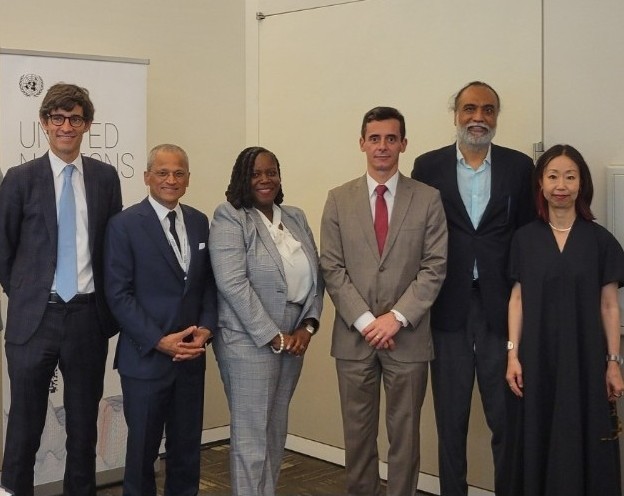St. Kitts and Nevis’ UN Representative Contributes Expertise to Global Risk Report Launch Panel
The 2024 UN Global Risk Report, a clarion call for international collaboration, underscores the escalating interconnectedness and severity of global risks, demanding a proactive shift from crisis response to prevention. Commissioned by the UN Secretary-General’s office, the report draws on a comprehensive survey encompassing government, private sector, civil society, and academic perspectives, providing a crucial snapshot of the most pressing global vulnerabilities and the preparedness of multilateral institutions to address them. The findings paint a stark picture of a world grappling with converging risks across political, technological, societal, and environmental domains, demanding immediate and concerted action. The report’s central message emphasizes that no single entity can effectively confront these global vulnerabilities alone; multilateral cooperation is paramount to mitigating their impact and building collective resilience.
Ambassador Mutryce Williams of St. Kitts and Nevis, a distinguished expert on public policy and homeland security, brought a critical perspective to the discussion surrounding the report’s findings, highlighting the unique challenges faced by Small Island Developing States (SIDS) in the context of escalating global risks. Focusing on the devastating individual and community impacts of natural disasters, exacerbated by the realities of climate change, Ambassador Williams emphasized the inherent vulnerabilities of SIDS and the protracted recovery periods following such events. Her poignant question, “How long does it take for one to ‘fully’ recover from a natural disaster such as a hurricane?”, resonated deeply, illuminating the profound and enduring consequences of these events on the economies, cultures, and very existence of SIDS.
Ambassador Williams echoed UN Secretary-General Antonio Guterres’ urgent call for global cooperation, recognizing the report as both a wake-up call and a blueprint for action. The report’s findings, she asserted, underscore the imperative for a paradigm shift from reactive crisis management to proactive risk prevention, from fragmented approaches to strategic foresight, and from division to a unified front of solidarity and resilience. This sentiment encapsulates the report’s core message: the future hinges on collective action to address shared global vulnerabilities.
The 2024 UN Global Risk Report identifies a critical gap between the significance of certain risks and the preparedness of institutions to address them, highlighting the concept of “global vulnerabilities.” This gap arises when critical risks are underestimated or overlooked, leaving societies exposed and ill-equipped to respond effectively. The report reveals a worrying trend: many identified risks are already manifesting as crises. Misinformation and disinformation, for example, a prominent global vulnerability, are recognized by over 80% of respondents as currently active threats, eroding trust in institutions and fueling social division.
Environmental risks dominate the global landscape, occupying five of the top ten most important risks identified in the report. This underscores the urgency of addressing climate change and other environmental challenges, which pose significant threats to ecosystems, economies, and human well-being. The report acknowledges the interconnected nature of these risks, emphasizing that environmental degradation can exacerbate other vulnerabilities, creating cascading effects across multiple domains.
The report identifies multilateral action, involving cooperation between governments, as the most effective strategy for mitigating global risks and overcoming persistent barriers such as weak governance and lack of prioritization. This highlights the critical role of international organizations and agreements in fostering collaborative solutions and facilitating the sharing of resources and expertise. The report also presents four future scenarios, illustrating how collective action in confronting global vulnerabilities can lead to either breakdown or breakthroughs, emphasizing the agency that nations have in shaping their future.
Ultimately, the 2024 UN Global Risk Report serves as a stark reminder of the interconnectedness of global challenges and the urgent need for collaborative action. The report’s findings provide a framework for understanding and prioritizing global risks, emphasizing the importance of preparedness, foresight, and multilateral cooperation. Ambassador Williams’ contribution, highlighting the unique vulnerabilities of SIDS, adds a crucial dimension to the report’s message, underscoring the need for tailored solutions and equitable distribution of resources to ensure that no nation is left behind in the face of mounting global challenges. The report calls for a paradigm shift from reactive crisis management to proactive risk mitigation, emphasizing the importance of global solidarity and resilience in building a more secure and sustainable future for all.
Share this content:












Post Comment